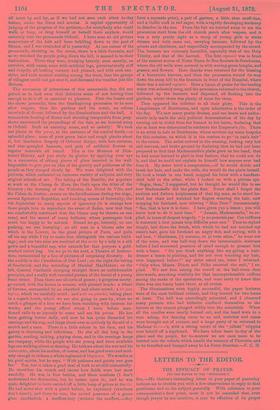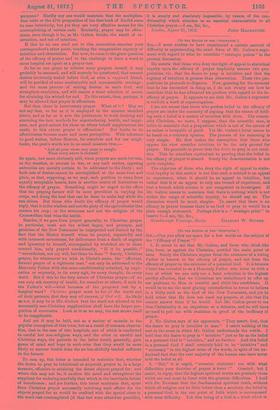LETTERS TO THE EDITOR.
THE EFFICACY OF PRAYER.
[TO THE EDITOR OF THE " SPEOTA.TOIL1
Galton's interesting letter in your paper of yesterday induces me to trouble you with a few observations in reply to that gentleman and on the subject generally. With reference to your correspondent's first point, must it not be conceded that, even though prayer be not intuitive, it may be effective of its proper
purposes? Hardly any one would maintain that the multiplica- tion table or the 47th proposition of the first book of Euclid come to man inthitively, but yet they are very effective means for the accomplishing of certain ends. Similarily, prayer may be effica- aious, even though it be, as Mr. Genoa thinks, the result of in- struction, and not of intuition.
If this be so, one need not in this connection examine your correspondent's other point, touching the comparative cogency of intuition and observation. But now, to come to the great question of the efficacy of prayer and to the challenge to have a ward in some hospital set apart as a prayer-test.
So far as one prays to achieve some purpose oneself, it may probably be assumed, and will scarcely be questioned, that earnest =desires reverently stated before God, as even a supposed friend, will be purified of some unattainable and unreasonable cravings ; and the same process of stating desires to one's God will -strengthen resolution, and will ensure a wiser selection of means for attaining the wished-for end. To this extent, then, perhaps, it may be allowed that prayer is efficacious.
But then there is intercessory prayer. What of it ? May we mot say that, so far as it is employed in the manner sketched above, and so far as it sets the petitioners to work devising and executing the best methods for superinducing health, and happi- ness, and good morals for those on whose behalf supplications are made, to this extent prayer is efficacious? But limits to its effectiveness become more and more perceptible. With reference to good wishes, before Heaven, for ourselves and for our neigh- bours, the poet's words are in no small measure true,— " And all your views may come to naught When every nerve is strained."
So again, but more obviously still, when prayers are made for rain, • or dry weather, or success in war, or any such matter, opposing entreaties are morally certain to be addressed to the Deity ; and both sets of desires cannot be accomplished at the same time and place, so that, supposing, as we may, each petition to come from equally acceptable hearts, here is another source of limitations to the efficacy of prayer. Something might be urged to the effect that the praying farmer will be most provident in varying his crops, and doing the best that can be done to make hay while the sun shines. But those who doubt the efficacy of prayer would reply, that it is the wisdom and not the piety of the agriculturist that secures his crop ; or the sternness and not the religion of the Cromwellian that wins the battle.
Besides, if we pass from prayer generally, to Christian prayer in particular, must not the widest hopes, and precepts, and promises of the New Testament be interpreted and limited by the fact that the Master himself when he prayed, repeatedly and with inten.sest earnestness, for deliverance from a death of anguish and ignominy to himself, accompanied by wretched sin in those around him, only prayed conditionally, "If it be possible ;" ." nevertheless, not my will, but thine be done "? Surely, Christian prayer, for whatsoever we wish in Christ's name, the "effectual, fervent prayer of a righteous man," can only be addressed to the Heavenly Father with this same conditionality attached, by impli- cation or expressly, to its every sigh, its every thought, its every word. But if this be the very nature of Christian prayer—if we can only ask recovery of health, for ourselves or others, if such be the Father's will—what becomes of the proposed test by a hospital ward ? Christian• prayer must be for all the wards and all their patients, that they may all recover, if God will. As likely as not, it may be in His wisdom that the ward not allotted to the aeceasarily non-Christian supplications shall have the larger pro- portion of recoveries. Look at it as we may, the test shows itself to be inapplicable.
And yet it may be held, not as a matter of miracle in the popular conception of that term, but as a result of common observa- tion, that in the case of two hospitals, one of which is conducted in careful but non-religious ways, and the other in careful and Christian ways, the patients in the latter would, generally, gain peace of mind and hope in such-wise that they would be more likely to recover health than the no less skilfully tended sufferers in the former.
To sum up, this letter is intended to maintain that, whether the desire to pray be intuitional or acquired, prayer is, in a large measure, effective in attaining the direct objects prayed for; and where this may not be, it soothes the mind and strengthens the euppliant for enduring manfully that which is the inevitable behest of beneficence ; and yet further, this letter maintains that, apart from Christian prayer necessarily involving such efforts for the objects prayed for as would be credited with the special cures in the ward-test contemplated (if that test were otherwise possible), it is simply and absolutely impossible, by reason of the con- ditionality which attaches as an essential characteristic to all Christian prayer.—I am, Sir, &c.,



































 Previous page
Previous page